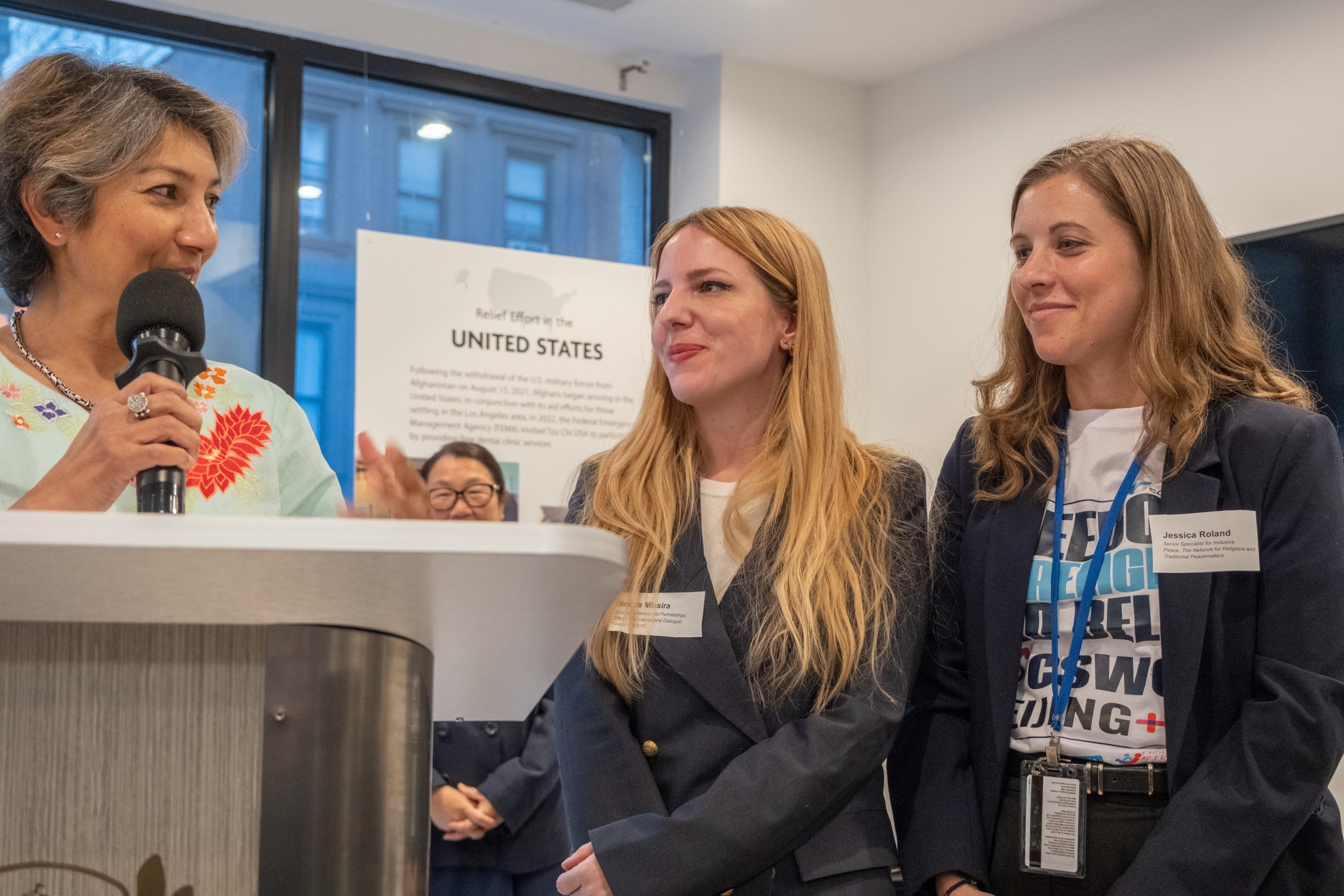New Co-Chairs Named for the
Multi-Faith Advisory Council (MFAC) Gender Working Group
March 2025
The UN Multi-Faith Advisory Council (MFAC) is proud to announce that Ms. Jessica Roland, Senior Specialist for Inclusive Peace at the Network for Religious and Traditional Peacemakers, and Ms. Dimitra Missira, External Relations and Partnerships Officer at the Executive Office of the Secretary-General at the International Dialogue Centre – KAICIID (a Peacemakers Network member) have been named as the new Co-Chairs of the MFAC Gender Working Group.

Ani Zonneveld, Founder and President of Muslims for Progressive Values (MPV), announcing Jessica Roland, Senior Inclusive Peace Specialist for the Network for Religious and Traditional Peacemakers, and Dimitra Missira, External Relations and Partnerships Officer at the Executive Office of the Secretary-General at the International Dialogue Centre – (KAICIID), as the new Co-Chairs of the MFAC Gender Working Group. March 2025.
The MFAC Gender Working Group supports the implementation of Agenda 2030 and beyond to ensure that the advancement of human rights is done through the prism of gender justice. The working group helps bridge the gap and assist the UN understand the impact of religion and religious beliefs on UN pillars, and in particular SDG 5. Further, the group aims to deepen the UN system staff capacities by providing strategic and policy guidance through engaging with faith-based organizations and broader religious communities for mutual benefit.
“Advancing gender equality has never been more important in a time of immense pushback. I am looking forward to utilizing the Gender Working Group as a platform to create meaningful partnerships and understanding to drive the recognition, participation and influence of faith communities in promoting an equal future for all.”
–Jessica Roland, Senior Specialist for Inclusive Peace at the Network for Religious and Traditional Peacemakers
Roland and Missira assumed their roles as Co-Chairs at the 69th UN Commission on the Status of Women (CSW), following the conclusion of Ms. Alison Kelly, Sustainable Development and UN Representative for ACT Alliance, and Ms. Ani Zonneveld, Founder and President of Muslims for Progressive Values (MPV), rotation as Co-Chairs.
“At this critical juncture, we need to build on the momentum of platforms like MFAC to foster greater understanding and collaboration between faith-based and secular organizations. By harnessing the collective strength and diversity of the Gender Working Group, we can break down barriers, amplify impact, and drive transformative action towards SDG 5 worldwide. I see this platform as the vehicle to ensure that the advancement of women’s and girls’ rights remain at the heart of global peacebuilding and sustainable development efforts.”
–Dimitra Missira, External Relations and Partnerships Officer at the Executive Office of the Secretary-General at the International Dialogue Centre – KAICIID
The Gender Working Group is comprised of 13 organizations from around the world: ACT Alliance; Islamic Relief Worldwide; Joint Learning Initiative; Lutheran World Federation; Muslim for Progressive Values; The International Dialogue Centre – KAICIID; The Network for Religious and Traditional Peacemakers; Soka Gakkai International; UN Women; World Evangelical Alliance; World Council of Churches and World Young Women’s Christian Association (World YWCA). Click here to learn more.
About the UN Multi-Faith Advisory Council
In 2010 the United Nations created the Interagency Task Force on Religion and Sustainable Development (UN-IATF), which today includes more than 20 UN agencies. Its purpose is to provide policy guidance around engagement with faith- based actors, deepen UN system staff’s understanding of the intersections of religion and the UN pillars of development, human rights and peace and security, as well as provide strategic policy guidance.
In September 2018 the UN IATF established the Multi-faith Advisory Council (MFAC), an informal and voluntary entity which consists of 45 religious leaders and heads of faith-based organizations (FBOs). The composition reflects the diversity of religions, regional and national presence, and covers different thematic areas that mirror the UN’s mandate.
Follow the Peacemakers Network on social
